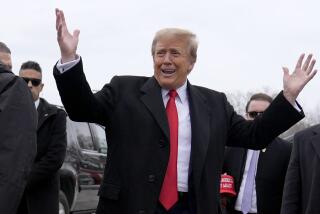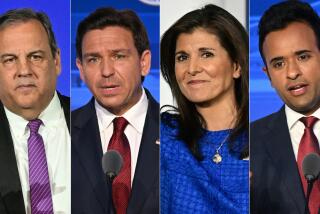Both Sides Now Turn to Court of Public Opinion
- Share via
WASHINGTON — It is as if the nation were split between two parallel universes--one Republican, one Democratic.
In one, the election is over, the president-elect has been chosen, and it’s time to get on with a transition to an orderly future. George W. Bush has defeated Al Gore in Florida not once, but four times. Anyone who wants another recount is just delaying the inevitable.
In the other, the election is still wide open--in fact, it’s anybody’s guess who will win. Texas Gov. Bush won a plurality of votes that were counted, but Vice President Gore won a plurality of the votes that were cast. Anyone who opposes another recount is just blocking the will of the voters.
With Florida’s recounts over, at least for now, and a long list of lawsuits a week or more from being decided, Democrats and Republicans turned Monday to the other major front in their postelection battle: public opinion.
And each side unleashed all the weapons of modern image-craft to try to convince voters in the middle that its version of reality is closer to the truth.
Democrats, led by candidate Gore in an evening broadcast, made a plea for patience.
Republicans, including candidate Bush, offered the allure of “closure” and a return to business-as-almost-usual. Bush put in a day’s work at the Texas state Capitol in Austin, while vice presidential candidate Dick Cheney mildly declared the transition underway in rented office space in Washington.
What each side wants is clear. The Republicans hope the public, and at least some Democrats in Congress, will tire of the long process of contesting the election and coalesce behind the idea that Bush has won.
On the other side, the Democrats are working desperately to keep that door from closing--to keep the public thinking of this election as a race that still is open.
“Every morning, we get up and proclaim the good news: It’s still too close to call!” Democratic National Committee spokeswoman Jenny Backus said, jokingly.
As long as Democrats and independents in the public consider the issue open, Backus and other Democratic operatives say, Gore still has breathing room to contest the results in Florida’s state courts. (They have given up on hoping for support from committed Republicans.)
But if the public begins to think of the election as over and of Bush as president-elect, they worry that Gore’s political options may disappear even if his legal options do not.
That’s why strategists on both sides are obsessively reading public opinion polls--including some that each party commissioned privately--and just as frantically monitoring the tone of television broadcasts, newspaper headlines and inside-the-Beltway gossip.
“What are you hearing?” a Gore advisor asked a reporter, and then quickly supplied his own answer: “We still have a shot at this.” But it sounded like a question as well as an assertion.
So far, the polls suggest that the Democrats do still have a shot, if a slim one.
An ABC News-Washington Post poll released Monday found that 60% of those questioned believe Gore should concede the election, and 35% believe he should not.
Those numbers appeared clear, but--naturally enough--they set off intense partisan debate about their real meaning.
To Republicans, the majority in favor of a Gore concession was a strong signal that they are making progress.
“Those numbers are stronger than they were two weeks ago,” GOP pollster Bill McInturff said. “A majority of people believe it was close, but Bush is ahead, and he is likely to win the presidency.”
McInturff forecast continuing erosion of support for Gore’s lawsuits contesting the Florida results and, if Gore suffers any significant legal setbacks, a sudden collapse.
If Florida’s courts refuse to restart vote counting in Miami-Dade and Palm Beach counties, McInturff said, “quicker than people imagine, the public reaction will be: He’s lost, it’s time to tie this up.”
But to Democrats, the same poll offered evidence that the public is still patient, still willing to let Gore play out his hand in Florida’s courts.
The survey showed the public still split evenly when asked which candidate it wanted to see win (43% for Bush, 42% for Gore) and found that 60% would accept a Gore victory if that was the outcome of the legal process.
“It doesn’t look like people have moved very much, or that they have washed their hands of the whole thing,” said Peter D. Hart, a Democratic pollster.
A nonpartisan pollster, Andrew Kohut of the Pew Research Center for the People and the Press, warned that surveys on this issue are more difficult to interpret than most. “The voters are flying blind, and so are the pollsters,” he said.
He noted that the ABC-Post poll was taken Sunday evening, immediately after Florida Secretary of State Katherine Harris officially certified Bush as the winner in the state, and could thus reflect a transitory swing of opinion in Bush’s favor.
Later polls, taken after Gore’s television statement Monday evening, could swing back, he suggested.
Meanwhile, both camps sought to shape public opinion.
The Democrats rolled out a phalanx of congressional leaders, led by Senate Minority Leader Tom Daschle of South Dakota and House Minority Leader Richard A. Gephardt of Missouri, who traveled to Florida to show that their party is solidly united behind Gore. Two Democratic senators who nearly broke ranks last week by suggesting that Gore not pursue his appeals to the bitter end, Louisiana’s John B. Breaux and Paul D. Wellstone of Minnesota, were persuaded to fall back in line as well.
In their public statements, Democrats began defining the deadline for the legal process as Dec. 12, the last day for Florida to name its presidential electors. The aim, one Democratic advisor said, is to win public acceptance of two more weeks for Gore to act--and to avoid the public fixating on the decision of the U.S. Supreme Court, which could come as early as Dec. 5, as an end point.
On the Republican side, GOP members of Congress continued passing through Florida’s television camera-infested landscape as well. But the main focus of Republican strategy was more subtle: the image, made available each day, of Bush and Cheney engaged in the quiet work of governing.
“They’re doing it quite well,” pollster Hart said admiringly. “Who’s looking like a president-elect? That is working to Bush’s advantage.”
Indeed, several Democratic advisors said they are worried that Bush is preparing to take the next step, and designate retired Gen. Colin L. Powell as his intended nominee for secretary of State.
“That’s their ace in the hole,” one said.
More to Read
Get the L.A. Times Politics newsletter
Deeply reported insights into legislation, politics and policy from Sacramento, Washington and beyond. In your inbox twice per week.
You may occasionally receive promotional content from the Los Angeles Times.











